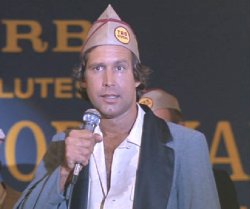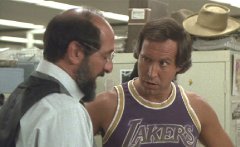Cinematic Pleasures: Fletch
by j.d. lafrance

For my money, Fletch (1985) is the best film Chevy Chase ever made. I can put the movie on at almost any time and still find it just as funny, no matter how many times I have seen it. And yet, the film is too often dismissed as just another dated piece of 1980s pop-culture (to be sure, the soundtrack is horribly dated – Stephanie Mills’ “Bit by Bit” anyone?). Or worse, it is deemed the sole highlight of Chase's career that subsequently went downhill over the years. But Fletch has endured, thanks in large part to repeated broadcasts on television channels like TBS and rock-steady video rentals (with revenues of $24 million in the USA alone and the DVD now out-of-print). So why does Fletch continue to inspire such a strong and loyal following after almost 20 years? It is simple: insanely quotable dialogue, a colorful assortment of character actors and, of course, Chevy Chase's inimitable, vintage smart-ass person.
When he's not avoiding his ex-wife's attorney ¬– Arnold T. Pants, Esq. (George Wyner) – Irwin "Fletch" Fletcher (Chase) is an investigative reporter who writes under the anonymous pen name, Jane Doe for Los Angeles newspaper. He is checking out the local drug trade on the beach and its links to police corruption when he is approached by Alan Stanwyk (Tim Matheson), a rich businessman who says that he is dying from bone cancer. He wants to pay Fletch $50,000 to kill him. After doing some digging, Fletch finds out that Stanwyk is lying and may also have some kind of involvement in the city's drug trade. His investigation ends up connecting these two seemingly unrelated plots for an exciting finale.
Fletch originated from a novel of the same name by Gregory McDonald. According to the author, the idea for the character came from hearing "from other people in the newsroom about other reporters doing these things for stories, and that gave me an idea. He was running around in my head for quite some time before I actually wrote the book." The novel was very successful and soon Hollywood came calling. His Fletch books were optioned around the mid to late ‘70s but the author had the option of approving the actor cast to play Fletch. McDonald remembers that "everybody from 12 to 72 in Hollywood wanted to play Fletch. But I kept throwing a monkey wrench into their plans." He rejected the likes of Burt Reynolds and Mick Jagger. When the studio mentioned Chevy Chase as Fletch, McDonald (even though he had never really seen Chase in anything) agreed.

Chevy Chase started out as a satirical writer for the Smothers Brothers, National Lampoon magazine, and Mad magazine. He started acting in a comedy workshop called Channel One in Greenwich Village in New York City. Chase learned the art of comedy through improvisation during his stint at the workshop. "A laugh is a surprise," he once said in an interview, "and all humor is physical. I was always athletic, so that came naturally to me." Chase shows a stellar range of physical comedy in Fletch. His technique ranges from broader displays, such as the dream sequence when he imagines himself as the unusually aggressive L.A. Lakers star power forward, to more subtle bits such as when he bangs his nose into a door, posing as the accident-prone Mr. Poon.
Chase enjoyed success early on in his film career with hits like Foul Play (1978) and Caddyshack (1980), but then hit a rut with Under the Rainbow (1981) and Deal of the Century (1983). By the time he did Fletch, Chase had bounced back with the massive commercial success of National Lampoon's Vacation (1983). Fletch would prove to be even more successful, and cement his reputation in pop culture forever.
Andrew Bergman was hired to adapt McDonald's book into screenplay form – although, the final draft screenplay mysteriously credits Field of Dreams (1989) director, Phil Alden Robinson, "from a draft by Andrew Bergman." Bergman was only 26 years old when Mel Brooks transformed his first script, "Tex X," about a black militant cowboy, into Blazing Saddles (1974). The money Bergman made from that script allowed him to stay in New York City, where he wrote The In-Laws (1979), a brilliant black comedy starring Alan Arkin and Peter Falk. Bergman went on to write several more screenplays for mediocre films in the '80s before working on Fletch. Bergman remembers that he wrote the screenplay “very fast – I did the first draft in four weeks...Then there was a certain amount of improv, and something that we used to call dial-a-joke. Michael [Ritchie, the director] found this aircraft hanger, and called me and said we need a scene set in an aircraft hanger. So I wrote it that afternoon.”
Director Michael Ritchie had much the same career arc as Bergman. He enjoyed success early on in theater and television, directing episodes of The Man From U.N.C.L.E. and Dr. Kildare in the 1960s, before breaking into feature films with Downhill Racer (1969) and The Candidate (1972) – both starring Robert Redford. After a successful run of films in the 1970s that included The Bad News Bears (1976), Ritchie directed mostly forgettable fare, like The Island (1983), until Fletch came along.
Capitalizing on the immensely popular action comedy, Beverly Hills Cop (1984), Fletch adheres to the same formula: the maverick protagonist who has a problem with authority, the use of multiple disguises to get in and out of dicey situations for comedic effect, the obligatory car chase, and even the hopelessly dated synth-soundtrack by Harold Faltermeyer. Fletch deviates in one significant aspect: Chase's character never uses a gun (he also repeatedly gets the bejeezus kicked out of him).

Fletch is essentially a vehicle tailor-made for Chevy Chase. It plays to Chase's strengths; in addition to his affinity for physical comedy, the movie is famous for showcasing his trademark deadpan smart-ass delivery of dialogue and his knack for playing a wide variety of characters – abilities he perfected on Saturday Night Live. Chase expertly juggles Fletch's numerous aliases. From the likes of the absent-minded Dr. Rosenrosen to Mr. Underhill's country club "friend," John Cocktosten, Chase makes each one distinctive and hilariously memorable.
Another aspect of Fletch that makes it so unforgettable is the strong supporting cast. The film features character actors like Joe Don Baker as the slimy Chief of Police Karlin (who brings a wonderfully scary intensity to his role), George Wendt as the amiable drug dealer Fat Sam, Tim Matheson as the double-dealing bigamist Alan Stanwyk, M. Emmet Walsh as the probing Dr. Dolan, and a young, pre-Thelma and Louise (1991) Geena Davis as Larry, Fletch's ever loyal co-worker. One of the joys of the movie is how Chase interacts with all these people and how they react to his flippant, off-handed remarks. Watch him in action in the hospital sequence as he confuses and befuddles the staff in order to get the information he wants – it is not only what he says to them but, more importantly, how he delivers the dialogue that makes it so funny.
Since Fletch, Michael Ritchie continued as a director-for-hire on a number of movies that didn't make much of an impact, except for Fletch Lives (1992) and the highly enjoyable James Woods con-man comedy, Diggstown (1993). Sadly, Ritchie died on April 16, 2001 from complications of prostate cancer. Andrew Bergman, on the other hand, enjoyed critical and commercial success with The Freshman (1990), which he wrote and directed, and also made two successful, box-office friendly romantic comedies starring Nicolas Cage – Honeymoon in Vegas (1992) and It Could Happen To You (1994).
Sadly, Chase's post-Fletch career has not been as triumphant. He starred in Fletch Lives, which has its moments... but, let's be honest, it is a pale imitation of the original. He has done a series of forgettable family-oriented films (Cops and Robbersons, anyone?) that feature Chase on auto-pilot. Even the man himself admits, "I made about 28 movies and I think about five of them were good."
The one hope on the horizon could be Kevin Smith's plans to revive the Fletch franchise. A long-time fan of McDonald's books, Smith hopes to make Fletch Won, not a sequel to the films but a prequel featuring a young Fletch to be played by Jason Lee, with the possibility of Chase as an older version to bookend the film in the present. Smith has said, "we’re going to do a real character with no disguises and shit like that. Yeah. It will be close to (the book). I loved that book. I don’t even think we’re going to do a pass on the script. I’m just going to hand everyone the book and highlight the dialogue because it works perfectly." Smith has repeatedly delayed plans to make Fletch Won and it is anyone’s guess as when he’ll get around to it.
More so than in any other film, Fletch is classic Chevy Chase. While he is in exceptional form in Caddyshack and National Lampoon's Vacation, they do not showcase his unique talents as befittingly as Fletch. In every scene, Chase does a fantastic job carrying the picture with the right mix of comedy and drama.
Fletch has aged surprisingly well over the years. The jokes are still funny and many of Chase's one-liners are insanely quotable. So much so that Fletch has become a cult film, inspiring at least four web pages dedicated to every alias, character, and catch-phrase of the movie. In an interview for the New York Post, Bergman tries to explain its appeal. “It’s so bizarre, but Fletch strikes a chord. There’s a group of movies like that in the ‘80s, like Caddyshack, too, that captured a certain wise-ass thing.” Chevy Chase also looks back on the film with fondness. “It was at the height of my career in film, and it was as close to me as a person as any part I’d played.” Perhaps the most meaningful praise comes from Gregory McDonald himself: "I watched it recently, and I think Chevy and Michael Ritchie did a good job with it." As Fletch would put it, "and a damn fine answer if I do say so my damn self."
Copyright (c) 2005 erasing clouds |
|